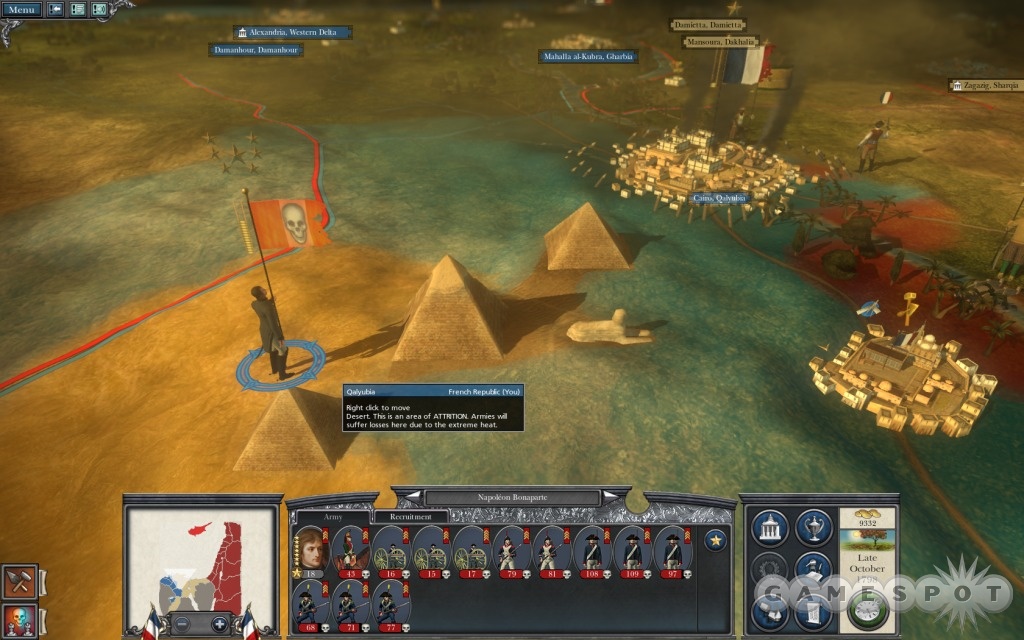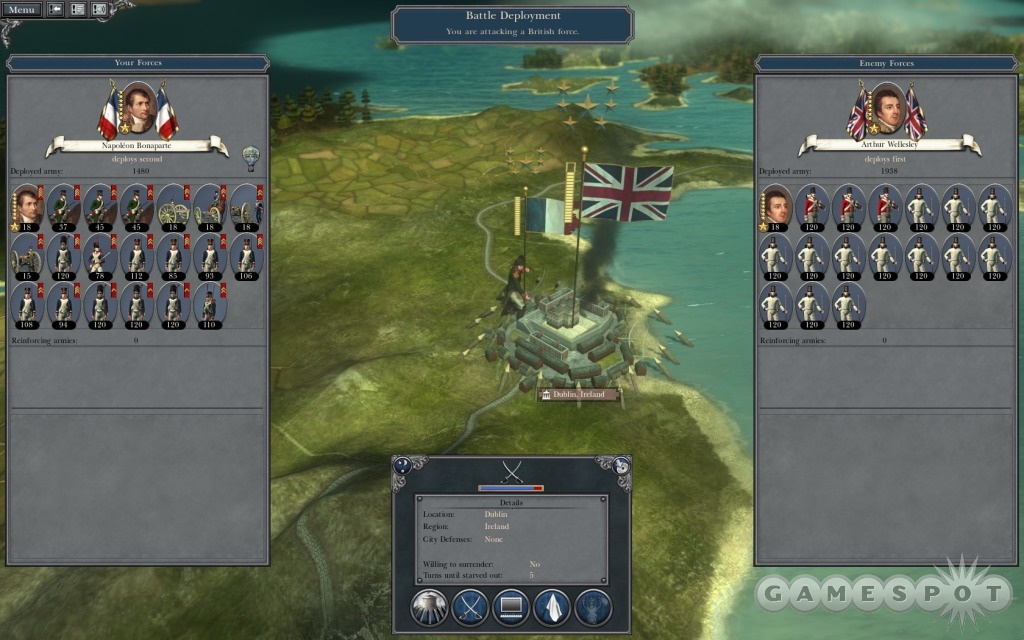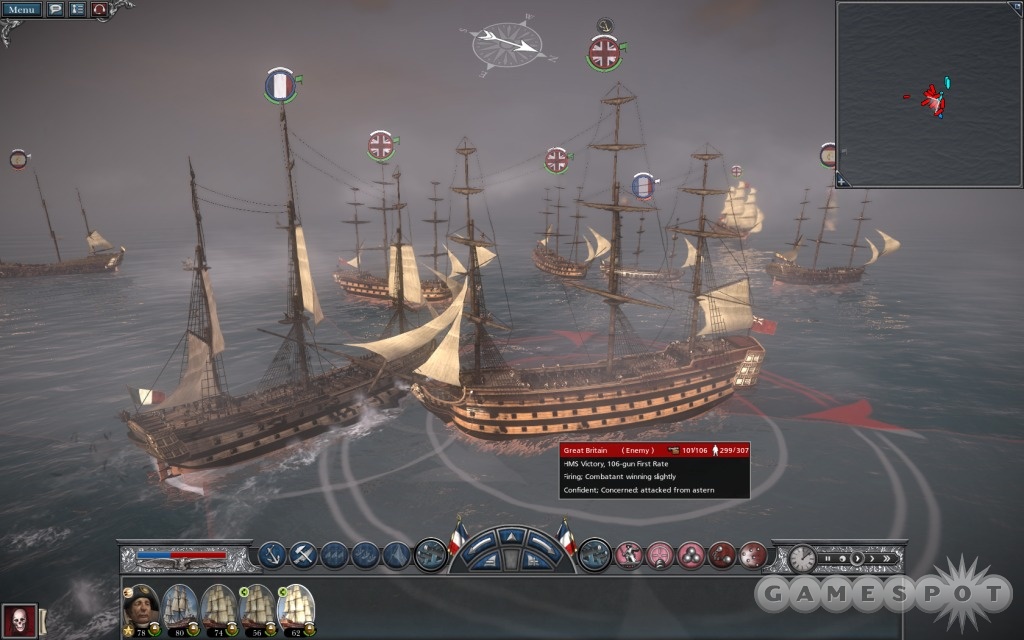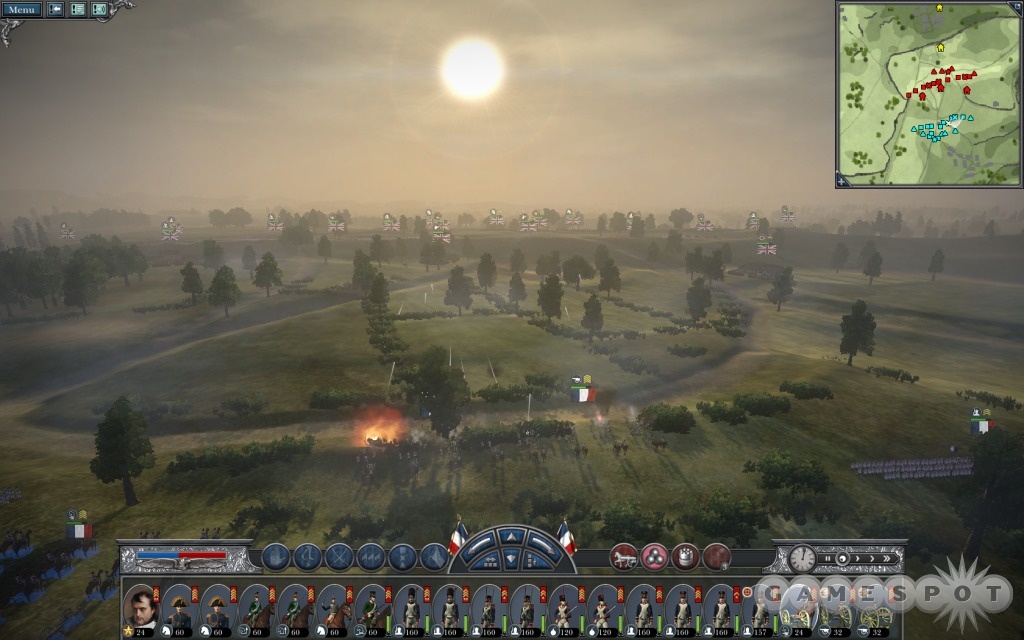Thanks to his radical, republican ideals and his astounding military accomplishments, Napoleon Bonaparte is remembered as a revolutionary figure. Napoleon: Total War, on the other hand, meddles very little with the tried-and-true formula of its predecessors, preferring instead to apply it to this new setting while executing a few tweaks and updates. Notable additions include powerful, historical generals, as well as weather and attrition effects. There are also additional multiplayer options, better graphics, and an improved interface. Meanwhile, the poor artificial intelligence remains a problem area for NTW, and its scale takes a step backward from the global reach of Empire: Total War. However, its immersive, well-executed setting, as well as its historical battles, enemies, and allies let you step into Napoleon's shoes to re-create his conquests, making it one of the most engrossing Total War games yet.

Like the previous Total War games, Napoleon combines a turn-based strategy mode with tactical, real-time battles. The turn-based portion of the game takes place on the strategic map where you make various strategic decisions, build infrastructure, develop research technologies, and move your armies. When an army engages in combat, you can either use the improved auto-resolve feature or fight it out in real time. As the attacker, your goal is to route the enemy army, but as the defender, you merely have to hold out until the time limit expires (20 minutes, 40 minutes, or 1 hour, depending on your settings). The optional time limit is a mixed blessing. Although it ensures that battles will eventually end, it also means that you can employ incredibly cheap tactics to win a defensive battle against an army of thousands by kiting your general around the map until the time runs out.
Napoleon: Total War takes you on a near-exhaustive journey through 20 years of Napoleon's major campaigns, from the Franco-Austrian fighting in Italy and the Egyptian expedition to the Napoleonic Wars in Europe and the battle of Waterloo. Another campaign lets you choose one of the other European powers--Austria, Prussia, Russia, or the United Kingdom--with which to destroy Napoleon's empire. Sadly, omitted is a Napoleonic campaign to drive the British out of India with the help of Muslim Indian leader Tipu Sultan, which was the ultimate goal of the Egyptian adventure. This alternate history scenario could have provided some novelty and widened the game's scale to a more global level. With the exception of Waterloo, each campaign takes place on a large strategic map comparable in size to one of Empire's theaters and provides up to 10 or more hours of gameplay. In another single-player mode, you control the French in a series of 10 historical battles, starting at Lodi in 1796 and ending at Waterloo in 1815.
Arthur Wellesley, the Duke of Wellington, once said that Napoleon's presence on the battlefield "made the difference of 40,000 men." While that's not quite the case in NTW, generals do play a much larger role. First, depleted units automatically reinforce back to full strength when they're attached to a general and within friendly territory, eliminating the need to buy reinforcements. In addition, each general has two special abilities that he can use in battle; one boosts the morale of nearby troops, while the other improves the accuracy of a specific unit. As with the previous Total War games, your troops will suffer major morale penalties if their general dies on the battlefield--it will probably hit you pretty hard as well--so you have ample reason to keep him alive. Thankfully, Napoleon himself never dies. Instead, he returns to his capital to convalesce for a while, which is a preferable alternative to losing the entire campaign because you neglected the emperor for a few seconds. In addition to Napoleon, the game portrays numerous historical generals and admirals. These range from the illustrious English Admiral Nelson, who devastated the French and Spanish fleets in an almost flawless victory at Trafalgar, to the ill-fated Marshal Ney, who led a disastrous French cavalry charge that may have lost Waterloo for Napoleon. The generals also gain bonus traits based on how you use them in battle during the course of the campaign, which can profoundly influence your success.

Another addition to NTW is a system of seasons, climate, and weather that produces various in-game effects. First, units suffer attrition damage in harsh, foreign climates. As a result, if you pursue an opportunity to steal camels from a Bedouin tribe in the middle of the desert, many of your troops will never make it back. Meanwhile, the native Bedouins won't have any trouble taking the heat. The attrition isn't necessarily ruinous, but you'll certainly want to have your army quartered in a city during the winter months, lest your precious old guard freeze to death. Weather also plays a role in the tactical battles since weapons are more prone to misfire in adverse conditions.
New building options are another addition to NTW, including supply depots, banking houses, and small arms factories, but the biggest change is a new ability that lets you switch a building from one type to another by paying a small fee. This means that you can turn a barracks into an opera house during peacetime and revert it back to a barracks when war comes. However, peace doesn't last long in NTW, so opera fans may be frustrated more often than not. The religious buildings from Empire are nowhere to be found, and universities still make the unwashed masses rebellious, so you have to concoct other ways to keep your people loyal. One simple method is to earn the people's respect by dominating your enemies on the battlefield and conquering multiple regions. On the other hand, you can win the hearts and minds of conquered peoples by peacefully occupying their region instead of looting it. And, on rare occasions, you can liberate an oppressed nation, such as the Poles, to create a friendly (and generous) independent protectorate. Diplomacy, in general, works well in Napoleon, and AI countries readily agree to sensible demands like trade agreements or military access rights for your allies.

Although NTW brings several improvements to the series, the artificial intelligence is still rather dense. That isn't to say that the AI hasn't learned anything. The AI's turns don't take as long as in Empire, and AI generals now understand that their troops are allergic to canister shots so they won't throw away countless lives in foolish charges against amassed artillery. While the AI's new survival instinct is a welcome change, it goes too far. For instance, Prussian troops who are supposed to be attacking your city will often march up and down the periphery of the map rather than storm fortified positions. Apparently afraid to attack, they'll run nonstop drills until they are almost out of time, at which point they'll mount a desperate, careless attack on your position. Perhaps their strategy is to menace you from just out of range until you send your forces out to be slaughtered out of sheer boredom.
Of course, the surefire way to avoid AI stupidity is to take advantage of Napoleon's multiplayer options. You and a friend can play the Egyptian, European, or Italian campaigns together as rivals or allies. Whether you'd rather re-create a historical war or just divvy up Europe as France and Russia, you'll have plenty to do. One great aspect of the multiplayer campaigns is that you can take over for the AI opponent when other players engage in combat. Unfortunately, turns tend to take a long time, so you need some pretty dedicated players if you ever want to make it through an entire campaign. Another novel multiplayer mode lets you either drop into another person's single-player campaign as the enemy in a real-time battle or open up your own campaign for human intervention. Sadly, this option is only available on certain battles, but it's a fun way to mix up the gameplay. Additionally, there are 15 historical battle scenarios for multiplayer, as well as a plethora of random land, sea, and siege battles.
Visually, Napoleon is exceptionally immersive and detail oriented. On the strategic map, you can feel soothed by the tranquil waves of the Mediterranean Sea, notice the subtle changing of the seasons as the first snows fall, and watch as the countryside makes its first shaky steps into industrialization. In battle, you can watch the cavalryman's lance connect with its target, buildings crumble beneath your hellish cannon fire, ships turn into floating infernos as their crews make desperate attempts to extinguish the flames, and hundreds of corpses litter the battlefield. These include men and horses alike, waiting for the carrion birds or the worms. It is marvelous. In light of all the visual stimuli, keeping track of the morale of your units, the traits of your generals, and your research progress can be a daunting task, but Napoleon's interface helps keep things manageable. Color-coded morale bars now float above your units during battle, and buttons for changing unit formations or using special abilities are clearly visible. Useful tool tips are also abundant in and outside of battle. Despite this, the interface never feels cluttered, and the bulk of the screen is always devoted to the action.

The sound effects are on par with the graphics, with cacophonous sounds of dying horses, cannon blasts, volleys of musket fire, and officers screaming orders in French that lend credibility to the battlefield. Additionally, the classical score offers hours of diverse music that fits the period beautifully. Assuredly, the emperor himself would be jealous that his own adventures lacked such perfect accompaniment.
Just as the real Napoleon dominated Europe with the same muskets, cavalry, and cannons used by his predecessors, Napoleon: Total War offers nothing radically different from the previous games in the series. However, it manages to improve upon the Total War franchise in almost every way while adding its own unique Napoleonic flavor. Whether it's the addictive turn-based campaigns or the thrill of running down routed Austrians with your cavalry, Napoleon offers countless hours of entertainment. Fans of the series, gamers with an affinity for "the Corsican," and European history buffs will all find plenty to celebrate with this release.



